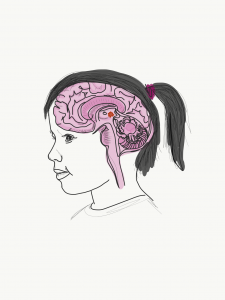Pediatric Brain Tumors & Spinal Tumors
UNC Pediatric Neurosurgery specializes in treating children with brain tumors and spinal tumors. A tumor is an  abnormal growth of tissue and can occur in the brain and spinal cord. Pediatric brain tumors and spinal tumors are categorized based on the type, size, and location of the tumor.
abnormal growth of tissue and can occur in the brain and spinal cord. Pediatric brain tumors and spinal tumors are categorized based on the type, size, and location of the tumor.
Signs of a brain tumor or spinal tumor in children may vary depending on a child’s age and the location of the tumor. Common signs of brain tumors and spinal tumors include frequent headaches, frequent nausea or vomiting, trouble with vision, balance problems, and behavioral changes. These symptoms can be caused by many other medical conditions unrelated to tumors. Parents should always consult with their child’s pediatrician when they have concerns about their child’s health.
If your pediatrician suspects that your child has a brain tumor or spinal tumor, imaging tests, such as an MRI, will be used to confirm the presence of a tumor. If a tumor is detected in the brain or spine, your pediatrician may refer you to a pediatric neurosurgeon.
According to the American Cancer Society, brain and spinal cord tumors are the second most common cancers in children and account for about 1 our of 4 childhood cancers. Not all brain tumors and spinal tumors in children are cancerous, and our UNC pediatric neurosurgery team works closely with pediatricians, oncologists, radiologists, pathologists, and colleagues around the country in the diagnosis and treatment of brain tumors and spinal tumors in children.
Treatments
UNC Pediatric Neurosurgery offers several different treatment options for children with a brain tumor or spinal tumor. A child’s treatment plan is dependent on a number of factors, including the type of tumor and the patient’s age. Our pediatric neurosurgeons want to safely remove as much of the tumor as possible with a goal of complete removal.
UNC Pediatric Neurosurgery offers the following treatment options for children with a brain tumor or spine tumor:
- Surgery for biopsy is performed to remove a sample of the tumor tissue to help our pediatric neurosurgery team learn more about the tumor and determine the best treatment plan.
- A brain tumor resection is used to completely remove the tumor or in some cases reduce the brain tumor’s size, which can then make additional treatment options, such as radiation or chemotherapy, possible.
- CyberKnife® is a non-invasive procedure performed by our pediatric neurosurgeons to remove brain tumors without needing to open the patient for surgery.
- Embolization or shunting may be performed a few days prior to removal of the tumor to decrease the amount of blood supply near the tumor.
- A craniotomy is performed by a neurosurgeon to temporarily remove part of the skull bone to access the brain. A craniotomy is commonly used in neurosurgery to treat many different neurological conditions, including the removal of a brain tumor.
- In addition to surgery, chemotherapy or radiation therapy may be necessary to prevent malignant (cancerous) brain tumors or spinal tumors from coming back.
We offer pediatric neurosurgery clinics in Chapel Hill, Raleigh, and Wilmington. Visit our pediatric neurosurgery clinic locations page for the clinic or hospital nearest you or call 984-974-4175 to schedule an appointment.
UNC Neurosurgery also offers brain tumor treatment and spinal tumor treatment for adult patients.